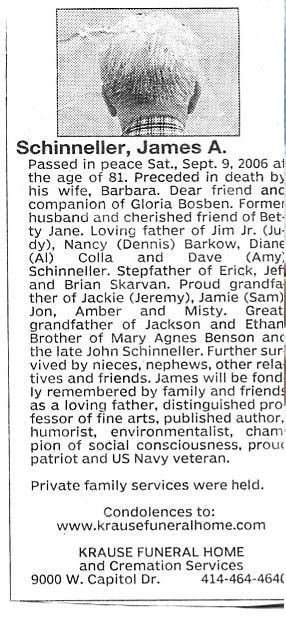 This step by step guide on how to write an obituary provides helpful information, examples, and guidelines, so that you can compose an appropriate and respectful obituary for a family member or friend. You don't have to put too much thought into this particular writing assignment, but it certainly does require some planning. It's a good idea to collect a few obituaries from the newspaper or online simply to use as examples and templates. You may also choose to gather a few of your friend's or family members' obituaries if you know any. These examples can be very helpful when compiling an outline or keeping all the necessary information straight. There are literally thousands of obituaries online. Some examples can show the deceased's career or education, hobbies, and interests. Others can illustrate important events or milestones in his or her life. What you write depends on what you want to emphasize. If the person's life story is rather short, looking at examples to ‘flesh it out’ will help. If the content is longer, you'll want to stick closer to the basics. Adding a little bit of personal biographical information can really help your content, as well. Once you've gathered examples of other people's writing, you should consider how to format your own obituaries. The typical method for doing so is to include the deceased's full name in front of a single title, such as "Master Mechanic." For a more unique style, consider including a small section at the top of the obituaries where you can insert a short quote or a phrase that sums up what the deceased meant to the people who knew and loved him or her. Including a personal quote or a sentiment can be a great way to write a funeral obituary, especially if you're having difficulty coming up with one yourself. Another helpful way to begin your writing is by brainstorming titles based on your starting point. Think about how the person lived, the things he or she did, and the impact that they had on those who knew them best. Try to think of ways you could weave these ideas into your obituary, making them flow well and fitting well with your desired length. If you have any specific ideas for what you'd like to include in your writing, try to incorporate them into your titles. Once you have an idea for the type of obituaries you want to compose, the next step is to decide whether you would like to address your subjects by their first or last name, or simply by a nickname. If you're using a first or last name, it might be useful to include the middle initial of the subject's last name as well. The obituaries you write for immediate family members should generally use the first name only. Expressions of gratitude for the deceased may be written by you, but should avoid using the last name or any other form of address unless it's clear to the reader that it should be that way. The titles of your family members' obituaries should also be limited to first and last names, as well. Many funeral professionals encourage the use of obituaries for both adults and children. While adults usually see their loved ones more than children do, many children are less likely to remember their departed friends or family members. That's why some publications provide for the placement of obituaries alongside articles about the life of the departed. These can often be found on the newspaper's classifieds page, or in a separate section of the paper. Some communities also encourage the placement of obituaries alongside other types of content, such as a memorial bulletin. As you finish putting together the information you'll include in your loved ones' obituary, it's important to choose what kinds of things you'd like to highlight. Do you want to focus on accomplishments, achievements, notable personal characteristics or traits, or stories about the departed? Remember, an obituary is not the same as a eulogy. An obituary is a statement of facts about a persons life. A eulogy is a brief life story of the deceased. An obituary is typically printed in a local newspaper or on a funeral home website. A eulogy is a speech given at the funeral or memorial service or celebration of life.
0 Comments
Your comment will be posted after it is approved.
Leave a Reply. |
Archives
July 2024
AuthorSteve Schafer is the founder of TheEulogyWriters and the author of hundreds of heartfelt, wonderful eulogies. He lives in Texas and has been writing eulogies for well over thirty years. The articles in this blog are designed to help people through the process of losing loved ones and exploring issues in the aging process. |
|
The Eulogy Writers
4092 Old Dominion Dr. West Bloomfield, MI 48323 |
Writers: Steve Schafer, Ralph DiBiasio-Snyder, Abi Galeas, Miriam Hill
Steve's Personal Cell Phone: (734) 846-3072 Our email address is: [email protected] |